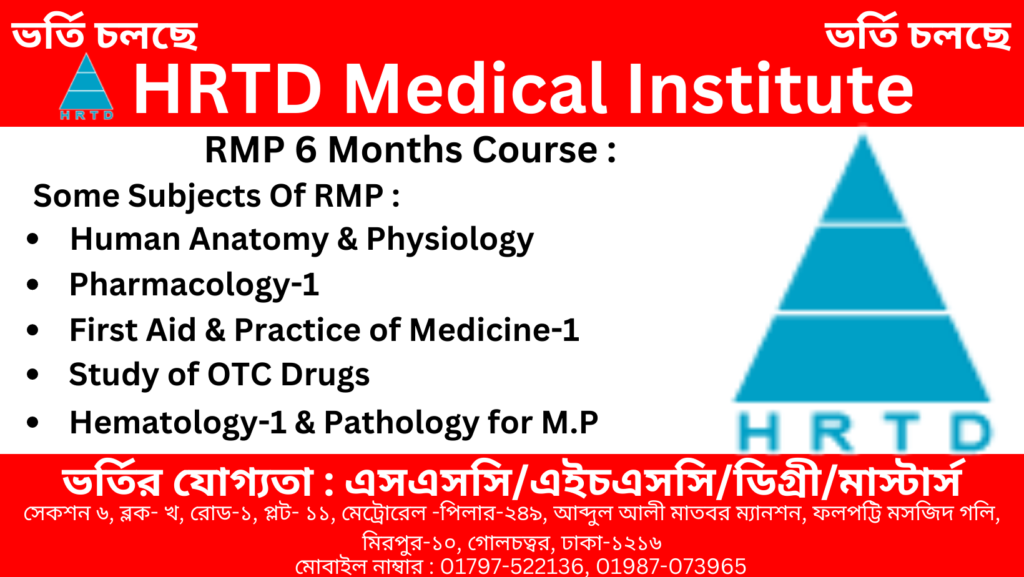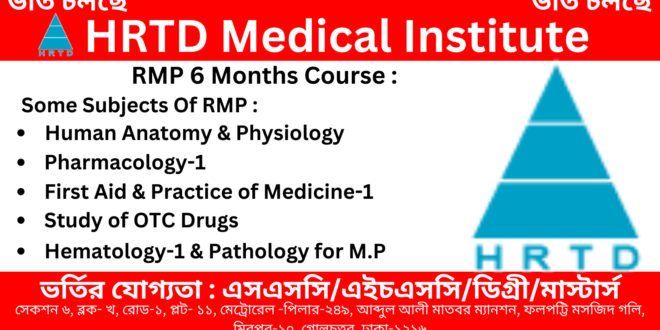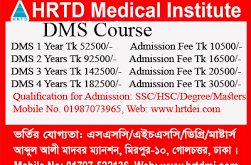RMP Course/Rural Medical Practitioner Details
RMP Course. Rural Medical Practitioner. Mobile Phone Number 01797522136, 01987073965. RMP Course is the short form of a Rural Medical Practitioner Course. It is a village doctor course. It is also called polli chikitsok course. This course is top-rated in Rural Areas of Bangladesh. The 6-month RMP Course contains 5 subjects and a total exam mark 500. The subjects are Human Anatomy and Physiology, Pharmacology, First Aid and Practice of Medicine, Study of OTC Drugs, Hematology and Pathology for Medical Practice. This Course is available at HRTD Medical Institute.
- Human Anatomy & Physiology……………..…..Marks-100
- Pharmacology-1………………………………….….….Marks-100
- First Aid & Practice of Medicine-1……….…….Marks-100
- Study of OTC Drugs……………………………….……Marks-100
- Hematology-1 & Pathology for M.P………..…Marks-100

RMP Course In Bangladesh
- Classes :
- Weekly Class 3 Hours in a Day for Jobholders.
- Weekly Class 3 Hours ( For Regular Students: Saturday 1 hour, Monday 1 hour, and Friday 1 hour)
- Total Classes ( 3 Hours × 24 )= 72 Hours.
RMP Course In Mirpur, Dhaka, Bangladesh
- Cost Summary :
- Total Course Fee: Tk 30,,500 /-
- Admission Fee: Tk10,500 /-
- Monthly Fee : (6 × 3000)=Tk18,000/-
- Exam Fee : Tk 2000 /-
Summary of RMP Course 6 Months 1 Year
The course fee for RMP 6 Months is Tk 30500/-, and RMP 1 Year Tk 52500/-. 6 Months contains 5 subjects and 1 year includes 10 subjects. The subjects are human anatomy and physiology, pharmacology, first aid, study of OTC drugs, hematology and pathology, microbiology, antimicrobial drugs, practice of medicine, etc. RMP Course 6 Months, and RMP Course 1 Year are available at HRTD Medical Institute.
Location of RMP Course
HRTD Medical Institute, Abdul Ali Madbor Mansion, Section-6, Block-Kha, Road-1, Plot-11, Metro Rail Piller No. 249, Mirpur-10 Golchattar, Dhaka-1216.
Qualification for Admission into the Rural Medical Practitioner
Minimum Qualification for Admission is SSC Pass. However, HSC, Bachelor Degree Pass, and Master Degree Pass students can be admitted into the RMP Course.
Subjects for the Rural Medical Practitioner Course
The subjects are human anatomy and physiology, pharmacology, first aid, study of OTC drugs, hematology and pathology, microbiology and antimicrobial drugs, practice of medicine, etc.
Teacher for Rural Medical Practitioner Course
Dr. Amena Afroze Anu, MBBS, PGT
Dr. Sakulur Rahman, MBBS, CCD
Dr. Benzir, MBBS, FCPS Final Part
Dr. Suhana, MBBS, PGT
Dr. Disha, MBBS, FCPS Final Part
Dr. Tisha, MBBS, PGT
Dr. Afrin, MBBS, PGT
Dr. Shamima, MBBS, PGT
Dr. Mahinul, MBBS
Dr. Bushra, MBBS
Dr. Turzo, MBBS
Dr. Rejoan Rana, MBBS
Dr. Sanjana, BDS
Dr. Jannatul Ferdous, MBBS, PGT
Dr, Nazmun Nahar Juthi, BDS
Dr. Kamrunnahar Keya, BDS
Dr. Lamia, MBBS
Dr. Jannatul Aman, MBBS, PGT
Class Time for Rural Medical Practitioner Course
Weekly Class 3 hours. There are two class systems. System for Job holders and System for Regular Students. For Regular Students Friday 1 hour, Saturday 1 hour, and Monday 1 hour. For Job holders, Friday is 3 hours, or Monday is 3 hours. Morning Shift 9:00 am to 12:00 pm, and Evening Shift 3:00 pm to 6:00 pm.
Anatomy and Physiology for Rural Medical Practitioner Course
Anatomy and Physiology is an important subject for medical science. The study of Body Structure and its functions is Anatomy and Physiology. Here we discuss the systems of the Human Body and its Organs, Tissues, and Cells. The systems of the Human Body are the Nervous System, Digestive System, Respiratory System, Circulatory System or Cardiovascular System, Skeletal System, Muscular System, Endocrine System, Immune System, Lymphatic System, Integumentary System or Covering System, and Urinary System.

Anatomy and physiology are the dual biological sciences that study the human body’s structure and function. They are inherently linked because a body part’s form (anatomy) often dictates what it does (physiology).
1. Anatomy (Structure)
Anatomy is the study of internal and external body structures and their physical relationships. It is divided into several branches:
- Gross (Macroscopic) Anatomy: The study of structures visible to the naked eye, such as bones or internal organs, often through dissection.
- Microscopic Anatomy: The study of tiny structures requiring magnification:
- Cytology: The study of individual cells.
- Histology: The study of tissues.
- Regional Anatomy: The study of all structures in a specific area, such as the head or thorax.
- Systemic Anatomy: The study of specific organ systems, such as the skeletal or nervous system.
2. Physiology (Function)
Physiology is the study of how body parts function together to sustain life. It explores the mechanical, physical, and biochemical processes of the body. Common areas include:
- Cellular Physiology: How individual cells work and maintain internal balance.
- Systemic Physiology: The function of specific organ systems (e.g., cardiovascular or respiratory physiology).
- Pathophysiology: The study of how disease or injury disrupts normal physiological processes.
3. Levels of Organization
The human body is organized into increasingly complex levels:
- Chemical Level: Atoms (e.g., hydrogen, carbon) and molecules (e.g., DNA, water).
- Cellular Level: The basic functional unit of life.
- Tissue Level: Groups of similar cells working together (e.g., muscle, nervous tissue).
- Organ Level: Different tissues working for a common purpose (e.g., stomach, heart).
- Organ System Level: A group of organs that cooperate to perform major functions (e.g., digestive system).
- Organism Level: The whole human being.
4. Core Concepts
- Homeostasis: The body’s state of steady internal equilibrium (e.g., maintaining body temperature or blood sugar). Most diseases result from a failure of homeostasis.
- Anatomical Terminology: Standardized language used to describe locations (e.g., superior, inferior) and body planes (e.g., sagittal, frontal) to avoid confusion.
Pharmacology for Rural Medical Practitioner Course
The study of Drugs and Medicine is called Pharmacology. Drugs are chemicals that can react with cells, tissues, and organs of the body. Here we discuss group-wise drugs and their medicines. Common Groups of Drugs are Pain Killer Drugs, Anti Ulcer Drugs, Anti Vomiting Drugs, Anti Viral Drugs, Laxative Drugs, Motility Drugs and Antimotility Drugs, Bronchodilator Drugs, Antibiotic Drugs, Anti Fungal Drugs, Anti Thrombotic Drugs, Anti Protozoal Drugs, Anthelmintic Drugs, Anti Hypertensive Drugs, Beta Blocker Drugs, Calcium Channel Blocker Drugs, ACE Inhibitor Drugs, Hemostatic Drugs, Analgesic Drugs, Antipyretic Drugs, Steroid Drugs, NSAID Drugs, CNS Drugs, Neuropathic Pain Keller Drugs, Spasmodic Drugs, etc.
First Aid for Rural Medical Practitioner Course
First Aid is an important subject for all courses. It is very important for the RMP Course. Here we discuss Shock, Classifications of Shock, Causes of Shock, Stages of Shock, Clinical Features of Shock, Hypovolemic Shock, Cardiogenic Shock, Neurogenic Shock, Traumatic Shock, Burn Shock, Electric Shock, Psychogenic Shock, Anaphylactic Shock, First Aid of Shock, Management of Shock, First Aid of Cut, First of Snake Bite, First Aid of Accidental Injury, etc.
Study of OTC Drugs for Rural Medical Practitioner Course
OTC is the short form of over-the-counter. That is OTC Drugs are over-the-counter drugs. The study of OTC Drugs is important for RMP Courses. These Drugs can be sold or purchased without any prescription from Registered MBBS Doctors. These Drugs are Emergency and Safe for the patients. The study of OTC Drugs improves the quality of practice. Some OTC Drugs are Paracetamol, Albendazole, Ascorbic Acid, Calcium, Multivitamins, Vitamin B Complex, Omeprazole, Oral Rehydration Salt, Salbutamol, Mebendazole, Neomycin, Gentamycin, Bacitracin, etc.
Hematology and Pathology for Rural Medical Practitioner Course
Hematology and Pathology are important Subjects for Medical Science. The study of Blood is called Hematology and the Study of Pathos is called Pathology. In Hematology and Pathology, we discuss blood cells, their morphology and functions, Blood Diseases, Common Pathos and their pathogenesis, Atrophy, Hypertrophy, Metaplasia, Gangrene, Pathological Tests like TC, DC, ESR, Hemoglobin Percentage, etc.
Microbiology and Antimicrobial Drugs for RMP Course
The Study of Microorganisms is called Microbiology. Microorganisms are the smallest living beings that cannot be seen without a microscope. The Drugs that are used for the treatment of Infectious Diseases are Antimicrobial Drugs. Microorganisms are Bacteria, Protozoa, Fungus, and Virus. Antimicrobial Drugs are Antibiotic Drugs ( Antibacterial Drugs), Anti Protozoal Drugs, Anti Fungal Drugs, and Anti Viral Drugs.
Practice of Medicine for RMP Course
The study of Disease and Treatment is called the Practice of Medicine. Actually, the Practice of Medicine means the use of medicine for treatments. This subject is important for a Rural Medical Practitioner. This subject discusses some common diseases. The points of discussion for the Practice of Medicine are the Definition of Disease, Causes of Disease, Clinical Features of Disease ( Symptoms and Signs), Investigation of Disease, Treatment of Disease, Complication of Disease, and Advice for the Patients.
Common Cardiovascular Problems
Common Cardiovascular Problems are an important issue nowadays. Common Cardiovascular Problems are Hypertension, Hypotension, Postural Hypotension, Tachycardia, Bradycardia, Abnormal Pulse, Heart Burn, Deficiency of Saturated Oxygen, Abnormal Heart Sound, Increase Bad Cholesterol, Heart Failure, Edema, etc. These problems are discussed as elaborately as possible. Bad Cholesterol are LDL, VLDL and TG.
Common Pediatric Problems
Common Pediatric Problems: Pediatric Respiratory Problems, Pediatric Digestive Problems, Pediatric Skin Problems. These are discussed in the Rural Medical Practitioner Course. Pediatric Respiratory Problems are Pediatric Pneumonia, Pediatric Nasal Congestion, Pediatric Asthma, etc. Pediatric Digestive Problems are Rotavial Diarrhea, Pediatric Flatulence, Pediatric Abdominal Discomfort, Pediatric Vomiting, and Pediatric Constipation. Pediatric Skin Problems are Tineasis and Oral Candidiasis, especially Tinea Capitis, and Tinea Crusis. Tinea is a fungus that causes Tiniasis. So, Tineasis is a fungal infectious disease. Candida is also a fungus and can cause oral candidiasis.
Gastrology for Rural Medical Practitioner Course
The study of the Gastro ( Stomach) in Medical Science is called Gastrology. Gastrology for RMP is an important subject. This Subject discusses the important part of Gastrointestinal Anatomy, Gastrointestinal Drugs, and Medicines, and Gastrointestinal Disease as elaborately as possible.
Common Points of Gastrointestinal Anatomy and Physiology are Anatomy of Tongue, Anatomy or Oral Cavity, Anatomy of the Esophagus, Physiology of Tongue, Physiology of Evola, Physiology of Epiglotis, Anatomy of Stomach, Anatomy of Small Intestine, Anatomy of Large Intestine, Anatomy of Cecum and Appendix, Physiology of Appendix, Digestive Sphincters, etc. Common Gastrointestinal Drugs are Anti Vomiting Drugs, Anti Ulcer Drugs, Motility Drugs, Antimotility Drugs, Laxative Drugs, Anti Diarrheal Drugs, Some Antimicrobial Drugs for Gastrointestinal Infectious Diseases. There are 6 Sphincters in the human digestive system.
Common Gastrointestinal Problems and Diseases are Vomiting, Nausea, Abdominal Discomfort, Hyperacidity, Gastric Ulcer, Duodenal Ulcer, GERD, Diarrhea, Dysentery, Amebic Dysentery, Bacillary Dysentery, Cholera, Constipation, etc.
Other Village Doctor Courses
Other Village Doctor Courses are the LMAF Course 6 Months, LMAF Course 1 Year, LMA Course 6 Months, LMA Course 1 Year, LMAFP Course 1 Year, LMAFP Course 6 Months, DMA Course 1 Year, DMA Course 2 Years, DMA Course 3 Years, DMS Course 1 Year, DMS Course 2 Years, DMS Course 3 Years, Paramedical Course 1 Year, Paramedical Course 2 Years, Paramedical Course 3 Years, DPM Course 2 Years, DPM Course 3 Years, DMDS Course 4 Years, DMSc Course 4 Years. All these courses are available at HRTD Medical Institute.
 MATCDHAKA – Medical Assistant Training Centre in Dhaka Pharmacy, Veterinary, Dental, Nursing, Pathology, Physiotherapy and Homeopathy Training Institute in Dhaka
MATCDHAKA – Medical Assistant Training Centre in Dhaka Pharmacy, Veterinary, Dental, Nursing, Pathology, Physiotherapy and Homeopathy Training Institute in Dhaka






